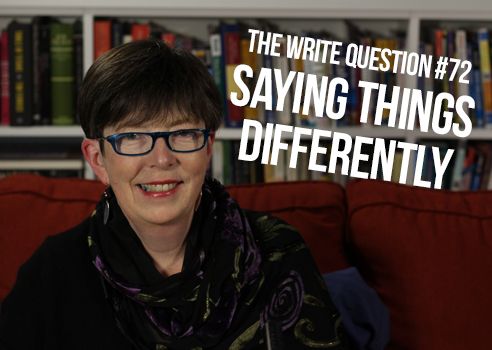Viewing time: 5 min. 11 sec.
The Write Question is a weekly video podcast about writing that I started in 2017 and that ran, more or less weekly, until April 2022. This is a republication of issue #72, with advice on how to say the same thing differently. The post first ran on Nov. 2/18.
Transcript:
Welcome to The Write Question, I’m Daphne Gray-Grant and my topic is how to say the same thing differently.
Today, I have a question from Reggie Swan, an engineer who didn’t tell me where he is based. Here’s what he’s asked.
“As an engineer, I do a lot of technical writing. I write audit reports, procedures for maintenance technicians, quarterly reports and policy documents. I need to find different ways to say the same thing. How do you suggest I approach this challenge?”
Thanks for your question, Reggie. Based on what you’ve asked, I’m not 100% clear about how you feel about the prospect of having to find different ways to say the same thing. Is it a challenge you regard as interesting or fun? Or is it just a gigantic pain in the ass?
If you’re erring towards the latter feeling, let me suggest you try to figure out ways to make it more fun for you. If we don’t enjoy and respect what we’re doing, it’s awfully hard to convince ourselves to do it.
So, let me tell you a story about why it’s so useful to have more than one way of saying something. A few years ago, I had a client who was very theoretical. To be frank, her writing was dull. To try to liven it up, I suggested that she start making it more personal. “Don’t you have any stories or anecdotes you can share?” I asked her. I used that precise phrase — which I thought was very clear — at least half a dozen times with her and it didn’t make one iota of difference to her writing.
Then, one day, I said, “where are some stories, anecdotes or examples?” And she said, “EXAMPLES? Why didn’t you ask me that earlier? That makes perfect sense.”
My client needed to hear the specific word EXAMPLES for my suggestion to make sense to her. Of course, it was just an accident that I used that word but ever since this accident I’ve been much more conscious of the power and importance of specific vocabulary.
We’re all different people and we all have different ways of learning, listening and reading. As a writer, it only makes sense to say the same thing in a variety of way so we can capture the attention of more people.
Begin by paying attention to your vocabulary. Can you find synonyms that allow you to express the same idea using different words? I very much like the resource the Visual Thesaurus and I’ve included a link below. There’s a free version and a paid one and the free will probably be more than enough for you.
What I like about the Visual Thesaurus is the way it groups words together. [Watch the video and you’ll be able to view a screen capture of the word “will” in Visual Thesaurus. You’ll see how it covers both the verb — to will something to happen — and the noun — a legal document.] I find the Visual Thesaurus incredibly useful and I use it just about every day.
Once you’ve varied your vocabulary, you can also think about different ways of presenting. For some people, tables and graphs might be helpful. For others, photographs will do the trick. Or others may need some line drawings. As a communicator, don’t fall into the trap of thinking that only words convey information. Often, visual images are even more helpful. These days you can also think of tricks — such as video — that would have been too expensive to consider 10 years ago but that now are very affordable with an iPhone.
One other point you should consider: Make sure that your final document meets the needs of your audience. In your question, you mentioned that you need to produce:
- audit reports,
- policy document,
- quarterly reports, and
- procedure reports.
I’m guessing that all of these various documents have different audiences perhaps with different levels of education and different understandings about what’s involved. Make sure you tailor your document to the needs of each particular audience.
Yes, rewriting the same thing can seem like a trial but it’s the best way of encouraging your specific audiences to take the time to read what you’ve written
Finally, as you reflect on how to say the same thing differently, let me wrap up with a quote from the late American humorist Mark Twain: “The difference between the right word and the almost right word is the difference between lightning and a lightning bug.”
Thanks for the question, Reggie. Keep working to express your information in a variety of ways. You don’t ever want to be accused of mixing up electrical storms with insects!


